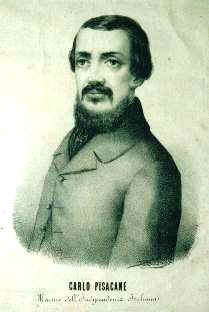Carlo Pisacane

Carlo Pisacane, Duke of San Giovanni (1818–1857) was an Italian patriot and one of the first Italian
Biography
Pisacane was born in Naples to an impoverished noble family, and entered the Neapolitan army in 1839; but having become imbued with Mazzinian ideas he emigrated in 1847, and after a short stay in England and France served in the French army in Algeria.[1]
The
Pisacane regarded the rule of the House of Savoy as no better than that of Austria. When Mazzini, undeterred by the failure of the abortive Milan rising on 6 February 1853, determined to organize an expedition to provoke a rising in the Neapolitan kingdom, Pisacane offered himself for the task, and sailed from Genoa with a few followers (including Giovanni Nicotera) on board the steamer Cagliari on 25 June 1857.[1][2]
They landed on the island of Ponza, where the guards were overpowered and some hundreds of prisoners liberated, and on 28 of the same month arrived at Sapri in Campania and attempted to reach the Cilento. But hardly any assistance from the inhabitants was forthcoming, and the invaders were quickly overpowered, Pisacane himself being killed.[1]
Propaganda of the deed
Pisacane was a pioneering advocate of propaganda of the deed, arguing that "ideas result from deeds, not the latter from the former, and the people will not be free when they are educated, but educated when they are free." He argued that violence was necessary not only to draw attention to, or generate publicity for, a cause, but also to inform, educate, and ultimately rally the masses behind the revolution. These ideas have exerted compelling influence on rebels and terrorist alike ever since.[3]
He was an atheist.[4]
Benito Mussolini was heavily influenced by Pisacane's revolutionary ideas and ideals to achieve political goals.[5]
References
- ^ a b c d One or more of the preceding sentences incorporates text from a publication now in the public domain: Chisholm, Hugh, ed. (1911). "Pisacane, Carlo". Encyclopædia Britannica. Vol. 21 (11th ed.). Cambridge University Press. p. 647.
- ^ M. de Landersef (29 May 1858). "The Cagliari at Anchor in the Basin at Naples". The Illustrated Times. p. 6. Retrieved 28 January 2023.
it is not necessary to recall how she (the ship) was seized by Pisacane's band of revolutionists, how she was captured, with two English engineers on board, by a Neapolitan ship of war, nor recount the contests that have been held ever since. ~ Meanwhile Bomba, succesfully [sic] keeps the affair open ~ the King has delivered up Watt and Park, who otherwise would might have complicated affairs by dying on his hands.
- ^ Hoffman, Bruce.(2006). Inside terrorism. New York, N.Y. Columbia University Press, p.5
- ^ Massimo Viglione, Libera Chiesa in libero stato? Il Risorgimento e i cattolici: uno scontro epocale, Città Nuova, 2005, p. 137.
- ISBN 9780520037991.
Further reading
- Carlo Pisacane. La Rivoluzione. Revolution: An alternative answer to the Italian question translated and introduced by Richard Mann Roberts. (2011)
